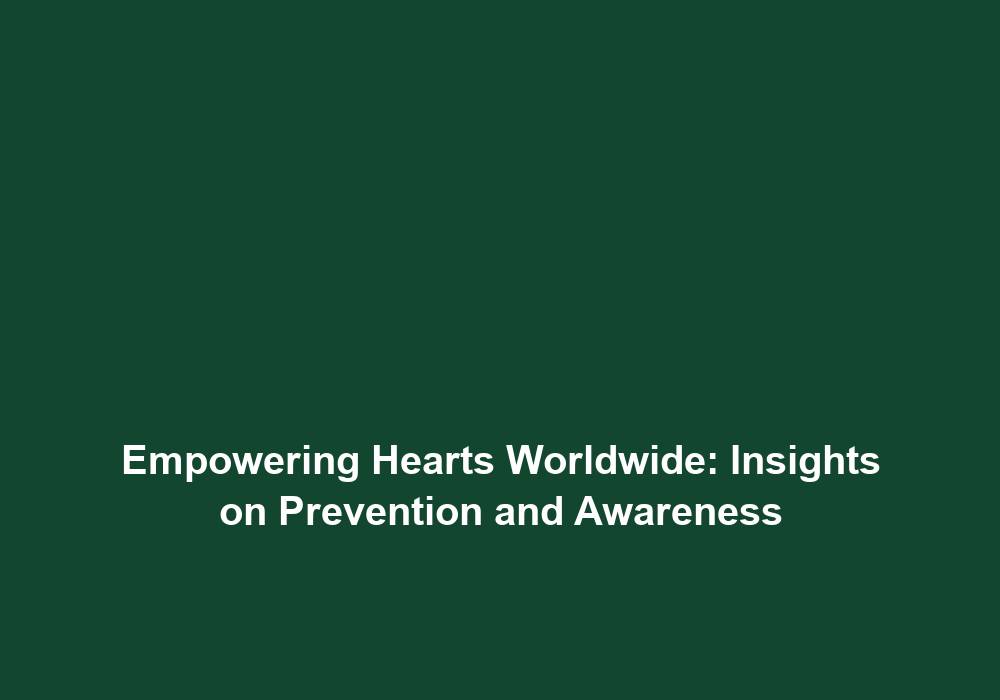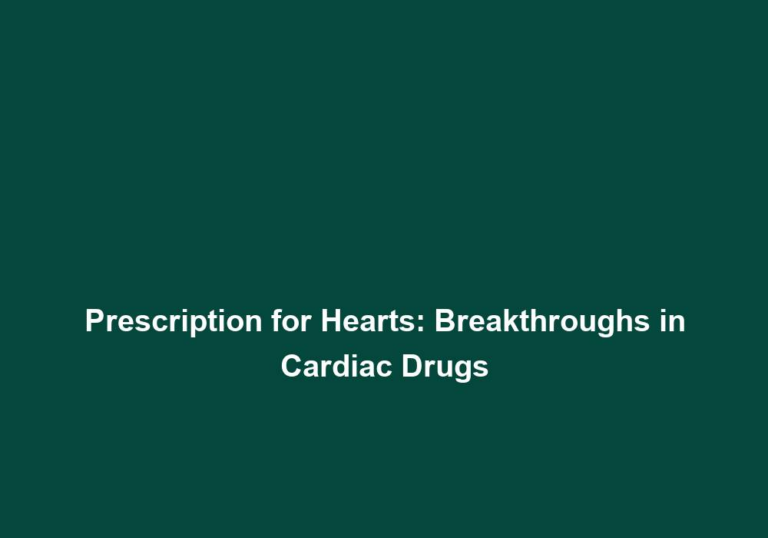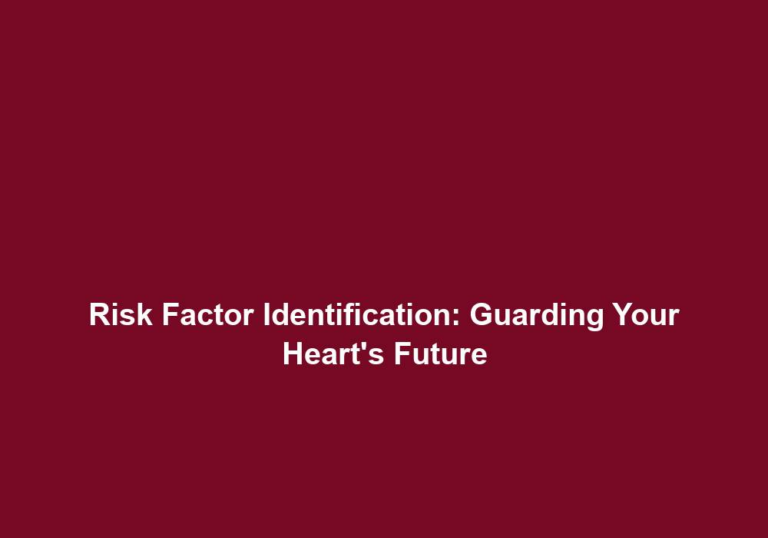Empowering Hearts Worldwide: Insights on Prevention and Awareness
Heart disease is a global health challenge that affects millions of people worldwide. Empowering hearts and promoting awareness about prevention strategies are essential in combating this silent killer. In this article, we will delve into the various aspects of heart disease prevention and shed light on the significance of raising awareness globally.
Introduction
Heart disease is a leading global health concern, responsible for millions of deaths worldwide. To effectively combat this silent killer, it is crucial to empower individuals and promote awareness about prevention strategies. In this article, we will explore the different facets of heart disease prevention and emphasize the importance of raising global awareness.
The Global Burden of Heart Disease
Heart disease, encompassing conditions such as coronary artery disease, heart attacks, and stroke, is the leading cause of death globally. According to the World Health Organization (WHO), cardiovascular diseases account for nearly 18 million deaths each year, representing approximately 31% of all global deaths. These staggering statistics underscore the urgent need for preventive measures and heightened awareness.
Understanding Heart Disease
Before delving into prevention strategies, it is important to have a comprehensive understanding of the various types of heart disease. This knowledge enables individuals to identify potential risk factors and take appropriate measures to safeguard their heart health. Some common types of heart disease include:
-
Coronary Artery Disease (CAD): This condition occurs when the major blood vessels supplying the heart with oxygen-rich blood become narrow or blocked due to the buildup of plaque. This restricts blood flow to the heart, increasing the risk of heart attacks and other complications.
-
Heart Attacks: Also known as myocardial infarction, heart attacks happen when the blood flow to a part of the heart is blocked, leading to tissue damage and potential life-threatening complications. Prompt medical intervention is crucial to minimize damage and improve outcomes.
-
Heart Failure: This condition arises when the heart cannot pump enough blood to meet the body’s needs, resulting in symptoms such as fatigue, shortness of breath, and fluid buildup. Effective management of underlying causes and lifestyle modifications can help improve heart function and quality of life.
-
Arrhythmias: Irregular heart rhythms can disrupt the normal functioning of the heart, potentially causing palpitations, dizziness, or even cardiac arrest. Diagnosis and appropriate treatment are essential in maintaining heart health and preventing complications.
Prevention Strategies
Prevention plays a pivotal role in reducing the burden of heart disease. By adopting a healthy lifestyle and managing risk factors, individuals can significantly lower their chances of developing heart-related complications. Here are some effective prevention strategies:
1. Healthy Diet
Maintaining a well-balanced diet is crucial for heart health. Including a variety of fruits, vegetables, whole grains, lean proteins, and healthy fats in your daily meals can help reduce the risk of heart disease. Additionally, limiting the consumption of processed foods, sugary drinks, and saturated fats is equally important. Here are some key points to consider:
- Incorporate a colorful array of fruits and vegetables, as they are rich in vitamins, minerals, and antioxidants that promote heart health.
- Choose whole grains such as brown rice, whole wheat bread, and oats, as they contain fiber and nutrients that support cardiovascular health.
- Opt for lean proteins like skinless poultry, fish, legumes, and tofu, while limiting red meat consumption.
- Include sources of healthy fats, such as avocados, nuts, and olive oil, which can help lower cholesterol levels and reduce the risk of heart disease.
2. Regular Physical Activity
Engaging in regular exercise is beneficial not only for physical fitness but also for maintaining optimal heart health. Aim for at least 150 minutes of moderate-intensity aerobic activity or 75 minutes of vigorous-intensity activity per week. Incorporate activities like walking, jogging, cycling, or swimming to keep your heart healthy and strengthen your cardiovascular system. Consider the following points:
- Find activities that you enjoy and make them a part of your routine. This increases the likelihood of sticking with regular exercise.
- Start slowly and gradually increase the intensity and duration of your workouts to avoid strain or injury.
- Consider incorporating strength training exercises at least twice a week to improve muscular strength and bone density, which are important for overall health.
3. Tobacco and Alcohol Avoidance
Smoking and excessive alcohol consumption are significant risk factors for heart disease. Quitting smoking and limiting alcohol intake can significantly reduce the chances of developing heart-related complications. Here are some important considerations:
- Quitting smoking is one of the most effective ways to improve heart health. Seek support from healthcare professionals or support groups to help you quit successfully.
- If you drink alcohol, do so in moderation. The American Heart Association defines moderate alcohol consumption as up to one drink per day for women and up to two drinks per day for men.
4. Weight Management
Maintaining a healthy weight is vital in preventing heart disease. Excess weight puts strain on the heart and increases the risk of developing hypertension, diabetes, and high cholesterol. Adopting a balanced diet and engaging in regular physical activity are effective ways to achieve and maintain a healthy weight. Consider the following tips:
- Aim for gradual and sustainable weight loss if you are overweight or obese. Losing just 5-10% of your body weight can have significant benefits for heart health.
- Avoid crash diets or extreme weight loss methods, as they can be harmful to your overall well-being.
- Focus on making long-term lifestyle changes that promote healthy eating habits and regular exercise.
5. Regular Health Check-ups
Routine health check-ups play a crucial role in identifying potential risk factors for heart disease. Regular blood pressure, cholesterol, and blood sugar screenings can help detect any abnormalities and allow for early intervention. Here are some important points to remember:
- Schedule regular visits with your healthcare provider to monitor your heart health and discuss any concerns or symptoms.
- Follow recommended guidelines for screenings and tests based on your age, sex, and medical history.
- Understand your numbers, such as blood pressure, cholesterol levels, and blood sugar, and work with your healthcare provider to maintain them within a healthy range.
6. Stress Management
Chronic stress contributes to heart disease risk. Adopting stress-management techniques such as meditation, yoga, or engaging in hobbies can help reduce stress levels and promote overall heart health. Consider the following strategies:
- Practice deep breathing exercises or meditation to help calm your mind and relax your body.
- Engage in regular physical activity, as exercise releases endorphins that can improve mood and reduce stress.
- Find activities or hobbies that bring you joy and help you unwind, whether it’s reading, listening to music, or spending time in nature.
Raising Global Awareness
Creating awareness about heart disease prevention is essential to empower individuals worldwide to take charge of their heart health. Here are some effective ways to raise awareness:
-
Educational Campaigns: Organize campaigns at schools, workplaces, and community centers to educate people about heart disease risk factors, prevention strategies, and the importance of early detection. Provide informative materials and resources to empower individuals to make informed decisions about their heart health.
-
Health Fairs and Workshops: Conduct health fairs and workshops where healthcare professionals can provide information, conduct screenings, and offer guidance on heart disease prevention. Engage participants through interactive activities and demonstrations to enhance understanding and encourage healthy lifestyle choices.
-
Social Media Campaigns: Leverage social media platforms to disseminate information and share success stories of individuals who have made positive lifestyle changes to improve their heart health. Utilize engaging visuals, videos, and infographics to capture attention and deliver impactful messages.
-
Collaboration with Healthcare Organizations: Collaborate with healthcare organizations, NGOs, and governmental agencies to coordinate efforts and maximize the impact of awareness campaigns. Pool resources, share expertise, and develop joint initiatives to reach a broader audience and create a lasting impact.
-
Engage with Influencers: Partner with influential individuals such as celebrities, athletes, or healthcare professionals to amplify the reach of awareness initiatives and encourage behavior change. Leverage their platforms and credibility to spread key messages about heart disease prevention and inspire others to take action.
-
Support Research and Development: Invest in research efforts aimed at developing innovative prevention strategies and treatment options for heart disease. By supporting scientific advancements, we can further enhance our understanding of heart disease and improve outcomes for individuals at risk.
Conclusion
Empowering hearts worldwide through prevention strategies and awareness initiatives is crucial in the fight against heart disease. By adopting a healthy lifestyle, managing risk factors, and promoting education, we can collectively reduce the global burden of heart disease. Let us join hands and empower individuals to prioritize their heart health, ensuring a healthier and happier future for all.







